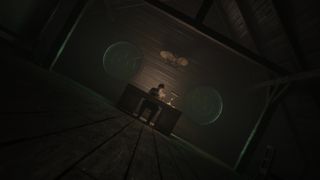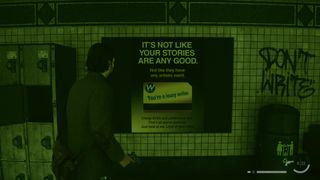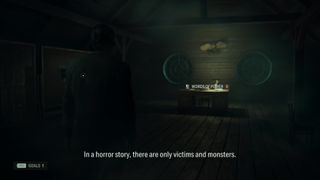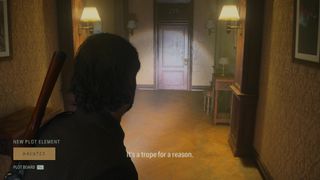Alan Wake might be a godly author – but is he a good one?
Opinion | If Alan Wake is a hack author, what does that mean for the game itself?

Alan Wake 2 has a moment in the first act where the titular character is exploring "The Dark Place," a realm shaped by his own thoughts and creative will and mixed with a healthy dose of otherworldly evil. As he wades deeper into an area represented as a subway station, he comes across signs that display the following: "It's not like your stories are any good. Not like they have any artistic merit. You're a lousy writer. Cheap thrills and pretentious shit. That's all you're good for. Just look at me. Look at your work."
Regardless of whether this is a manifestation of Alan's insecurity or just spooky shadow ghosts trying to make him cry, you still have to wonder: are these signs right? Is Alan a mediocre hack? And if he is, does Alan Wake 2 itself know that? And either way, in a game all about writing, what the hell are we, the players, supposed to make of that?
Two wrongs don't make a writer

To answer the first question: art is as subjective as ever, but I can't say that Alan Wake as a character comes across as a real literary powerhouse. His long-running Alex Casey novels were presented as bona fide thrillers in the first game, but now we get to hear sections of them in Alan Wake 2, and they ain't great: caricatures of noir storytelling stuffed with clichés and mixed metaphors. They make far less sense coming from an acclaimed mainstream author than, say, a high school student concussed by a well-slung copy of The Big Sleep.
Meanwhile, the manuscript pages you find around the game aren't particularly impressive either. They're staccato, hyper-dramatic, stereotypical snippets that feel more like first-draft blurbs than authentic pieces of a wider novel, as though Wake wanted somebody to bellow "Dun, dun dunnn!" at the conclusion of every page.
And yes, I know that Alan is writing them to engineer his escape and not to win a Nobel Prize. And yes, they're only pieces of a text, and a theoretical full novel might put them in a better context. And yes, in reality they're meant to act as teasers, hints and world-building for the player, telling us about events past and future… But they still have story context, and that context suggests to me that Wake's work probably fills a lot of discount bins in charity shops.
But hey, let's go deeper! Beyond what's written down, the "Dark Place" that's reflective of Wake's creative power is characterised by heavy-handed symbolism often so blatant there's nothing symbolic about it, like alleyways plastered with graffiti that just… tell him what's happening and what he should be thinking about it. His special incantations, the Alan Wake 2 Words of Power, are called "Words of Stuff" and "Words of Gun", suggesting he doesn't have much of a vocabulary to work with. And when crafting his stories in the Writer's Room, Wake keeps lapsing back into obvious tropes and well-trodden frameworks, apparently unable to think beyond basic archetypes or get too experimental with his work.
Alan Wake's Darkplace

Now, all this isn't actually a criticism of Alan Wake 2. If Remedy wants to characterise our hero as an unremarkable airport novelist writing summer shlock for the people who read one book a year, I say more power to them! It's an idea far richer in storytelling potential than yet another narrative about a misunderstood genius or a burned-out creative, kinda Bojack Horseman via True Detective. But is that what Remedy is doing? Is Alan Wake meant to be read as a bad author?
Sign up to the GamesRadar+ Newsletter
Weekly digests, tales from the communities you love, and more
That one's harder to argue either way, as both games seem to skirt around the issue a little without making any declarative statements. He's certainly financially successful and passionate about his work, but sadly we all know that's no guarantee of anything. Outside opinion doesn't help frame things much either; when people talk about his work (like Rose being obsessive or Casey being sneering) their comments are clearly meant to tell us more about their individual characters than the books themselves.
Call the truth hazy at best, though considering that ninety percent of Wake's dialogue is commentary on the craft of writing that rarely goes contradicted, that does seem to indicate that we're meant to see him as an authentic authority on all things authory. So why does it matter? All this might seem like nitpicking, and yeah, in most other games it absolutely would be – but Alan Wake 2 has opened a whole box of worms with its broader metanarrative.

The Alan Wake series is about a writer altering reality through his fiction. Both games are based on the idea that Alan has written novels – Departure in the first game; Initiation/Return in the second – and that these books are effectively coming true. Within context and canon, Alan Wake is, at least in part, the writer of both games.
If Wake is meant to be seen as a bad writer, that doesn't reflect too well on the Alan Wake franchise, right? After all, the canon is that he wrote it.
And with that realisation, it suddenly feels like the game has loaded a gun and pointed it at its own head. Think about it: if Wake is meant to be seen as a bad writer, that doesn't reflect too well on the Alan Wake franchise, right? After all, the canon is that he wrote it. But on the other hand, if Wake is meant to be seen as the next Hemingway, then that becomes an incredibly arrogant claim for any game to make about itself, and would perhaps set too high a standard for a franchise that thought it would be really clever to call its central character 'A. Wake'.
But metanarrative of this kind is always pretty risky, as it massively alters the relationship between characters, story, author and reader. The narrative of Alan Wake 2 is now, among other things, also commentary about protagonist Alan Wake, with every beat and nuance becoming an insight into his priorities, mindset, and ability. It has a knock-on effect, and ultimately, for a game that has so much to say about writing and storycraft, it might help us to know just how the creator at the core of all this commentary is supposed to be perceived: as the king of Stephen Kings, or a B-minus Bachman at best.
For an appraisal of the game as a whole, check out our Alan Wake 2 review to see what we had to say about Remedy's latest Mind Place manifestation, or read about our exclusive visit to the Alan Wake 2 live action set!

Joel Franey is a writer, journalist, podcaster and raconteur with a Masters from Sussex University, none of which has actually equipped him for anything in real life. As a result he chooses to spend most of his time playing video games, reading old books and ingesting chemically-risky levels of caffeine. He is a firm believer that the vast majority of games would be improved by adding a grappling hook, and if they already have one, they should probably add another just to be safe. You can find old work of his at USgamer, Gfinity, Eurogamer and more besides.
Most Popular



